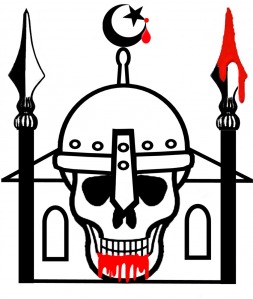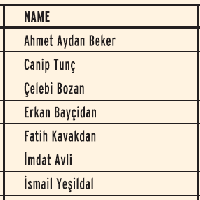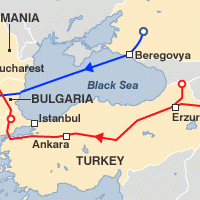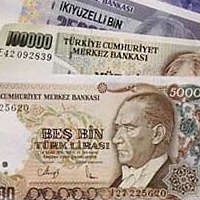A closer look at Recep Tayyip Erdogan’s world view, mixing Western concepts of progress, modern Turkish nationalism and Islamic traditions. But does all this go hand in hand with his attitude towards women?
First published: October 15, 2003; also available in PDF; Eurozine
Why there is a Turkish carpet on the psychiatric couch
It took more than an ordinary effort to get fully armed for the encounter: Bright red lipstick, with a scarlet silk blouse to match; a push-up brassiere; a mini-skirt far above my bare knees; high, very high, heels. I was not proud, to say the least. But due to circumstances I had no other choice. I did not expect him to arrive less well-equipped. As I pounded him with questions, my eyes clinched with his. Measuring every breath he took, calculating every move, studying every change in his face, I scribbled down the details my tape recorder could not detect. He answered every question patiently, carefully. At the end, frustrated, exhausted, with no more avenues left, I struck one more time directly on his faith. And asked: “Do you really believe in God?” Yet again, I received another ordinary answer. I surrendered and started to pack. But right that moment, I heard him say it: “Now I will tell you this. A man looks at a woman in only one way. This is why we have to cover women – to protect them. It is for your own good.” It hit me like a bolt of lightening. That moment, I saw him revealed as himself for the first time. Yes, as I had suspected it. Throughout the interview he had looked at me “in only one way” – thinking of sex – but he had not given me any hint of it.
The interview mentioned above with Recep Tayyip Erdogan took place during his visit to the United Nations to organize a Habitat conference in Istanbul when he was the newly elected mayor of the city. Six years later, his party won the national election in Turkey, securing a majority in the parliament on the eve of the war in Iraq, amidst one of the worst economic crisis in the country’s history.
Now, I know quite a number of men who are not followers of Islam who would agree with Erdogan’s opinion. Most, however, prefer the opposite solution: They wish women were not covered at all! This shared dilemma – to cover or not to cover?- seems to be something that the man of Islam and the man of the West can recognise in each other.
It is no coincidence that in the wake of September 11, American intelligentsia, eager to prove the existence of a “moderate” Islam, have begun to develop considerable “trust” for Recep Tayyip Erdogan. Yet this trust is still tentative and quite uncertain. In fact, during different phases of the war it sometimes stumbled. Therefore, I still frequently encounter questions that prove its fragility: “What would be his mistake? What should we be looking for?” These sceptics, searching for the real man behind the mask, are about to discover, as I myself did six years ago, that he is only wearing his own face. It is a face that sometimes mirrors the West, sometimes reflects the East, and nowadays appears to be more and more “pragmatic and convincing”. But is it really?
Due to circumstances beyond his control, Erdogan, too, is often not what he is. In his election, he was to have become the Prime Minister of Turkey yet he was not. A poem that he read in 1997 got him jailed under the article 312 of Turkish penal code for inciting hatred, and he was barred from holding office. Even that poem is not exactly what he said it was.
He recited the poem in a public speech in the Southeastern town of Siirt, professing that it was written by his “main inspiration,” “his favoured poet”, Ziya Gökalp. Gökalp (1876-1924), did write a poem called “Soldier’s Prayer.” The poem was first published in 1913 in the “Towards to the People” (Halka Dogru), a magazine that appeared during Bulgarians and other nations battled the Ottoman army of Sultan Resad for their independence in the Balkans. The poem was meant to boost military morale. However, it did not have the lines that Erdogan recited and was jailed for: “The minarets are bayonets, the domes helmets, the mosques our barracks, the believers our soldiers.”
Instead, Gökalp’s “Soldier’s Prayer’s” first stanza translates as follows:
“Holding my rifle in my hand, keeping my faith in my heart I wish two things: The faith and the homeland My home is the army, my sovereign is the Sultan Strengthen my Sultan, Almighty Give him long life, Almighty Our journey is our victory, the end is martrydom…”
The poem Erdogan recited went as follows:
“The minarets are our bayonets; the domes are our helmets Mosques are our barracks, the believers are soldiers This holy army guards my religion Almighty Our journey is our destiny, the end is martyrdom…”
After this beginning, the rest of the poem was kept true to the original, except the stanza that praised the army which was taken out altogether. This is what was omitted from Gökalp’s poem:
“Commander and lieutenant are our fathers Sergeant and corporal are our brothers In rank and file, it is our law Let the army be perfect, Almighty Let the banner be dominant, Almighty…”
When Erdogan was being accused of inciting hatred and conflict among the people by reciting this poem, these changes were used as evidence against him in order to reveal his vision. As he himself explained during his trial, he first learned about Gökalp at his high school Dar-ül safaka (The School of Enlightenment), a foundation for poor children and orphans. Gökalp was the most influential reformist in the late Ottoman Empire and a major proponent of Turkish nationalism. He was born in Diyarbakžr during the collapse of the multiethnic Ottoman society in one of the most horrifying episodes of ethnic conflict in history – the forced emigration of Armenians living in Eastern Anatolia. During this dark and chaotic time, he developed the conceptual framework of Turkish nationalism, expressed in his famous lines: “The country of the Turks is not Turkey, nor yet Turkistan, Their country is a vast and eternal land: Turan”.
“Turan” meant the political unification of the entire Turkish speaking population in Minor Asia (Turkey), Russia, Persia, Afghanistan, China into a single state; pan-Turkism, in other words. Gökalp saw no other alternative at the time when nationalist sentiments were on the rise and was influenced by the corporatism that later gave birth to fascism in Europe. He then developed his own synthesis – outlined in “Principles of Turkism” (1923): “There is only one way (…) which is to emulate the progress of the Europeans in science, industry and military and legal organisation, in other words to equal them in civilisation. And the only way to do this is to enter European civilisation completely.” Indeed, he expressed one of his conclusions with these words: “Nietzsche’s perfect human being is indeed the Turk who has been the new human for every century (…) One of the reasons being that the sensibility of the Turk was never feminized.” (This is why I decided to “feminize” when I interviewed Erdogan six years ago, so that I could find out what harm “feminization” would do to the perfection of “manhood”. His words about “covering women” explained that it was not femininity he was worried about: It was masculinity that he did not trust. As he continued to argue his point, I realized that this was exactly how he becomes pragmatic and convincing. Tricked by his own mind and his desire, he accepts a defined guilt -as he says, man sees woman in only one way. Yet inadvertently he chastises the female by covering her/ rather than chastising the male).
With his philosophy, Gökalp was not only a mentor of pan-Turkism but also represented one of the main forces behind Turkey’s orientation towards the West. He is therefore often rightly labelled “the philosopher behind Atatürk’s Revolution” although Mustafa Kemal Atatürk, who founded the Turkish Republic in 1923, was determined to end the monarchy and reign of religion in order to create a modern secular state. He was not impressed by Gökalp’s suggestions about the Caliphate, the alphabet and the dress code (especially regarding women, he clearly was not in the same camp as those who argued that “females should be covered” ) After the defeat of fascism in Europe, Gökalp and his corporate ideal was more and more identified with an isolated pan-Turkism movement in the Republic of Turkey. But the dream of reviving the essence of Gökalp stayed alive, especially during the intensified Cold War against the Soviet Union. In this process, devotees made an attempt to “reform” the poem “The Soldier’s Prayer”. Also, the word “victory” was replaced by the word “destiny” in order to strengthen the poem’s Islamic spirit.
We can gather from these lines that Erdogan sees himself as a “soldier”, who is on a journey. He has two flags , one is Islamic green and the other Turkish red, and his journey will end in “martyrdom” as his destiny. But the “martyrdom” here is not necessarily an act of suicide. The “martyrdom” he aspires to belongs to this world. He is marching and rising with Islam towards Europe to access modern Western civilization. When he arrives there, he hopes he can explain some practices such as the covering of women as an essential part of Islamic culture. It could well be alternative to uncovering women. He has already won some understanding in that respect. As he also succeeded, during his term as mayor of Istanbul, in banning advertisements displaying women in bikinis on municipal billboards. He managed to prohibit food and beverages being served in municipal cafeterias during the Islamic fasting months of Ramadan. He called himself the “imam” of Istanbul. He said “democracy is not a goal, it is only a vehicle” – a remark he later denied.
As long as he continues to make progress along his course, he would achieve “martyrdom” in the spirit of the poem, and so would be guaranteed as many houris as he likes in the Muslim paradise, an eternal harem bountiful with voluptuous virgins. More importantly, he might even manage to convince the world that one of the most important cultural characteristics of Islam is not only to cover females into an unrecognizable state of shame but also to practice polygamy. Providing he has the financial means, a man in Islam can have up to four wives. Thus he can enjoy the Muslim paradise on Earth. Who could blame this man for his nostalgia for a time when the Turkish man of some means had the right to a harem? For the time of the Pasha who was the object of great envy as the heir to an exotic Islamic tradition that found nothing depraved in polygamy – or, for that matter, in sexual slavery? Should he not have the opportunity to prove that Turkish males, as once fabled, were great connoisseurs of feminine beauty and addicted to all sorts of erotic experience?
Indeed, it was in the same period of history that Sigmund Freud started to develop his famous theory on “Death and Sexuality.” Upon observations of his assistant, Alois Pick, who once pointed out that the Turks of Bosnia-Herzegovina showed an admirable resignation to the vicissitudes of fate whereas, in a curious contrast, they tended to confer upon sexual pleasures a truly supreme importance to the point of attributing no value to a life without sex, Freud visited Trebinje near Ragusa in Bosnia-Herzegovina, as the respected Freud expert, Peter J. Swales revealed in his recent article called “Freud, Death and Sexual Pleasures.” It was at that time Freud started to cover his ottoman with a Turkish carpet that was made in the Turkish port city of Izmir (Smyrna). It was a gift to Freud from his “half-Asian” brother-in-law and distant blood-relative, Moritz Freud, a merchant, who had acquired the carpet in Salonica in western Macedonia (present day Greece), then a Turkish province and the centre of the white slave trade. Swales argues that Freud also harboured a wish for a harem of his own. He claims that the carpet, “used to cover an ottoman when in 1886 Freud had first set up private practice, had doubtless influenced his curiosity when discussing such matters (sexual practices of Turkish males) with Pick…” It is an interesting coincidence that, when Freud’s brother-in-law was in Salonica buying this carpet, the city was the capital of the Union and Progress Movement, better known as the “Young Turks”, who, under the influence of Gökalp’s pan-Turkism, would later be a major force in creating the new Turkish nation.
Maybe one need not aspire death to be admitted to paradise of houris, since one could realise the eternal dream of the male right here on Earth. Erdogan’s reasoning will continue to appear pragmatic and convincing. The dilemma he presents is indeed the same labyrinth in which we found ourselves during the rise of many other autocratic regimes in the past. I cannot help but think such a man, surely, would not be trustworthy, as he himself admitted when he explained that a man sees a woman in only “one way.” As Sigmund Freud foresaw this in 1898, writing: “… there still remains plenty of work for the next century – during which our civilization will have to learn to come to terms with the claims of our sexuality.” Even though Freud’s time frame has expired, I can only hope that Erdogan will not display once again the same male weakness and incompetence that created a whole history of crimes against humanity, but will accept responsibility for his deeds and misdeeds.
You may also want to read more about Recep Tayyip Erdogan here.
About the Author:
Şebnem Şenyener is a journalist and novelist. She was contributor to the Turkish monthly Varlik. She has published 4 novels. Her “New York Art Thrillers” were serialized in Milliyet’s monthly art magazine. She has lived in New York since 1982.
Mazzeltov,
Crethi Plethi



 RSS
RSS












RT @CrethiPlethi: Erdogan, Turkish Nationalism and Islamic traditions http://bit.ly/6F2FmQ
RT @CrethiPlethi: Erdogan, Turkish Nationalism and Islamic traditions http://bit.ly/6F2FmQ
RT @RantsbyRemnant RT @CrethiPlethi: Erdogan, Turkish Nationalism and Islamic traditions http://bit.ly/6F2FmQ
RT @edhyperlinks: RT @RantsbyRemnant RT @CrethiPlethi: Erdogan, Turkish Nationalism and Islamic traditions http://bit.ly/6F2FmQ